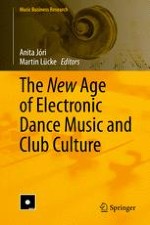2020 | OriginalPaper | Buchkapitel
10. The Discourse Community of Electronic Dance Music Through the Example of the TB-303 Owners Club
verfasst von : Anita Jóri
Erschienen in: TheNewAge of Electronic Dance Music and Club Culture
Verlag: Springer International Publishing
Aktivieren Sie unsere intelligente Suche, um passende Fachinhalte oder Patente zu finden.
Wählen Sie Textabschnitte aus um mit Künstlicher Intelligenz passenden Patente zu finden. powered by
Markieren Sie Textabschnitte, um KI-gestützt weitere passende Inhalte zu finden. powered by
